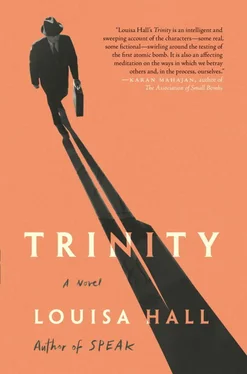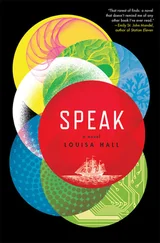Afterward, we sat together and cut place cards out of thick ivory paper.
Sometimes, when we’d finished our work, we’d go up to my childhood bedroom and sort through my sister’s belongings. She’d left so little behind. There were a few of her dresses still hanging up in the closet, but her desk was perfectly clean, and her drawers were perfectly empty. The only artifact I could find was that book she labored over so long: the photographs she’d collected of those bombed cities.
When I pulled it out of her drawer, I felt as if I were peering into something forbidden and lurid, something kept hidden in the back rooms of disreputable bookstores, a book that girls in the suburbs weren’t meant to discover.
While my mother hovered behind me, I peeked at one or two of the earliest pictures—streams of people in black and white, processing like orderly ghosts through an utterly demolished city, their arms held out from their sides, their forearms hanging down, trying to avoid friction between their burned limbs.
Later, there were pictures of patients in the hospitals, the petechiae that showed up to warn them they’d die of radiation poisoning, the thick scars that disfigured their faces, the anxiety in the eyes of those patients who lined up in the waiting room still exhibiting no signs and only waiting for the secret poisoning to make itself known, without knowing when or how it would do so.
Under the photographs there were captions in her neat print. Under the photographs of those ghosts, she’d written, “Some were vomiting as they walked.” And under the photographs of petechiae, “These were a reliable sign that the patient would die.” Under a photograph of the rubble, a month or so after the bombs dropped, she’d written: “By September, the ruins were covered in green—goosefoot, purslane, daylilies, clothbur, sesame, bluets, panic grass, and feverfew—the underground organs of plants having been stimulated by the bomb, so that all fall they grew verdant and fat over the ashes and the bones of the unclaimed dead in the city.”
Then I closed the book. I put it back in the drawer. The only other artifact I found from my sister’s life was that sampler she hadn’t embroidered, which was shoved at the back of one of my own desk drawers.
I must have stolen it.
There it was again: that blank circle of cloth, framed by bent wood.
I placed it on her empty bookshelf, and later, I took it with me to Princeton.
SOMETIMES, DURING THOSE MONTHS, IF I COULDN’T SLEEP BECAUSE Iwas sad, or because I was nervous about the upcoming wedding, my mother sat on the side of my bed and stroked my hair until I felt sleepy.
I liked them so much, those last months with my mother.
I hoped they’d never end. As the weekend of the wedding approached, I became increasingly nervous, and the night before the ceremony, I couldn’t sleep.
Then I went to my parents’ room and woke my mother up, and we lay in my childhood bed until morning.
BEFORE LUNCHTIME, STAN’S PARENTS ARRIVED, ACTING OVERDRESSEDand self-conscious.
My mother ignored them. Which goes to show how much things were changing. My mother had always been strict about manners, but on the morning of the ceremony, when Stan’s parents arrived, she ignored them completely and focused on helping me fasten my hair with the mother-of-pearl comb that she lent me.
Around noon, Kathy arrived. In the absence of my sister, I’d appointed her as my maid of honor. She and her exemplary boyfriend had broken up, and she sulked around unhappily while I got dressed, and wasn’t polite to my mother, and only rose from the divan to assist me when I asked if she’d help me button my dress up.
Then she tried to help badly, and made it seem as if she couldn’t do it.
Witnessing this, my mother rose from her seat. She gave Kathy a look that sent her shrinking out of the bedroom, and then she easily buttoned that dress. It wasn’t even a struggle at all.
I’d lost weight since my sister died, and by then I was 117 pounds.
Standing behind me, buttoning all those cloth-covered buttons, my mother looked small and severe. She was wearing her dark purple wool suit with matching pillbox hat, and she looked like a stern little girl, holding a big doll very tightly.
There we stood together, in front of the mirror: me and the woman who had once pried open my jaw.
Clearly, we had both changed. We had both been very affected.
In an odd tone of voice, she told me I looked beautiful. I asked her if she knew how much I loved her.
WHEN THE SERVICE STARTED, MY FATHER WALKED ME DOWN THEaisle. He stumbled once, but we kept going.
Then he gave me away to my new husband.
At the altar, he released me and returned to his seat, and my mother didn’t look at him. She was staring directly at me. I stared back at her from the altar. Neither one of us smiled through the whole service. We never took our eyes off each other, and beside me, missing it all, poor Stan wore a gray suit and looked happy.
POOR STAN. WHEN I THINK OF HIM NOW, STANDING SO FULL OF HOPEin his suit, I almost think that I could start crying.
After the wedding, at the reception, under the tent my parents put up on the tennis court on our back lawn, everyone except me and my mother ate shrimp cocktail and chicken salad on crackers.
That night, Stan and I slept in a hotel. He made love to me as you’d make love to a bride, and afterward, though he hadn’t, he worried he’d hurt me.
Once he’d fallen asleep, I lay awake.
I missed my mother. I missed my childhood bedroom. I counted the hours until we could return to have breakfast.
Then, in the kitchen, where I’d once found that newspaper and ate those frozen cookies, Stan the happy newlywed wolfed down his breakfast.
Cheerfully, he ate every last bite of the running yellow yolk, the bacon flanged with wet fat, as though he’d never had a sister who died.
As if he’d never opened a dead sister’s book to see written in her neat print, “All fall they grew verdant and fat over the ashes and the bones of the unclaimed dead in the city,” he scraped his plate clean, and when he’d finished, Stan and I drove to Princeton in the station wagon my parents had bought us.
Then I was a wife. The Korean War was still being fought, and by then the air force had dropped more incendiaries on Korea than they’d dropped in the whole Pacific Theater in the entire Second World War, and also I woke up as a wife.
I walked around as a wife, and in the afternoons I called my mother and talked to her as a daughter.
I CALLED MY MOTHER AT LEAST ONCE EVERY DAY. SOMETIMES WEtalked for hours on end.
In the beginning of my marriage, when I wasn’t working at the institute yet, I had a lot of time to myself, more than I’d ever had when I took art history classes and went along with Kathy’s romantic arrangements.
So I’d call my mother, or go out for walks, and sometimes, idly, while listening to Stan’s records, or flipping through a magazine, I’d wonder if now that I had so much time, I’d finally write that Great American Novel that I’d once dreamed of writing at Rosemont.
Sometimes, I tried, but the scale of the whole thing seemed stupidly ambitious and gross. Then I tried writing stories, until one day I figured out it was easier to write poems. I could spend a long time carefully revising those poems, expending a great deal of energy futilely attempting to fix all their flaws, until one day I figured out that the best way to perfect them was to systematically delete all the words.
Then I realized it would be easier not to start them at all.
After that, I mostly just wandered around our apartment, wondering what it would be like to be a movie star, or where I’d like to travel in Europe.
Читать дальше












